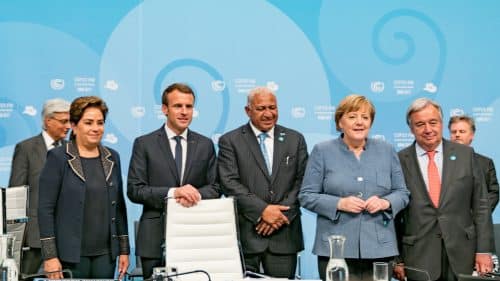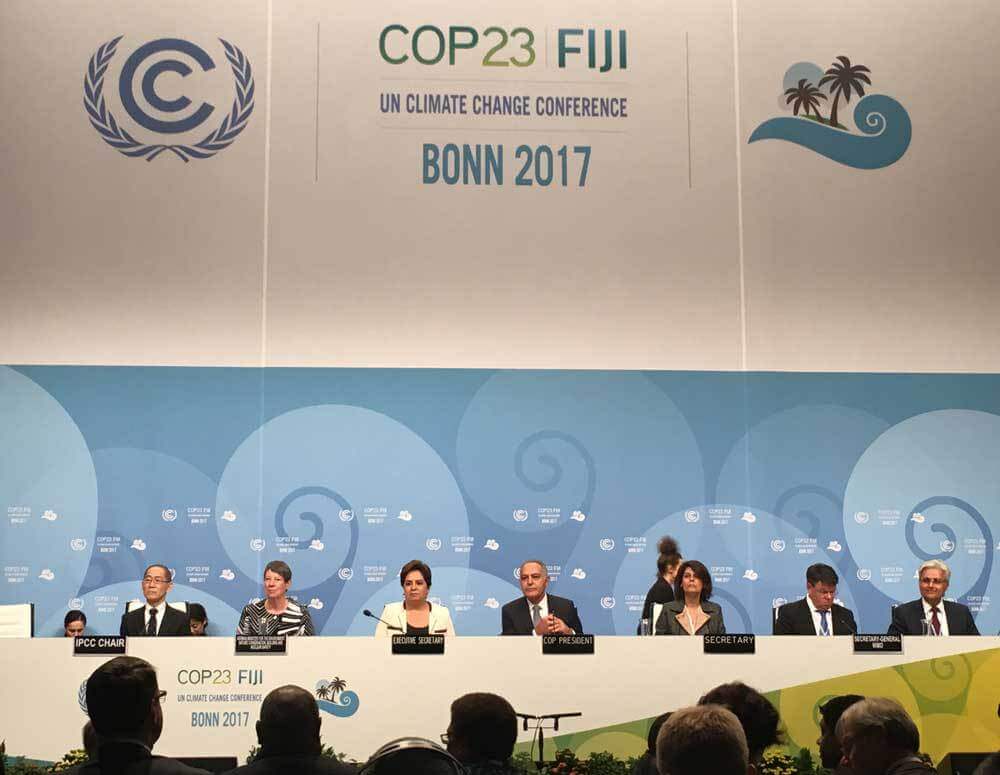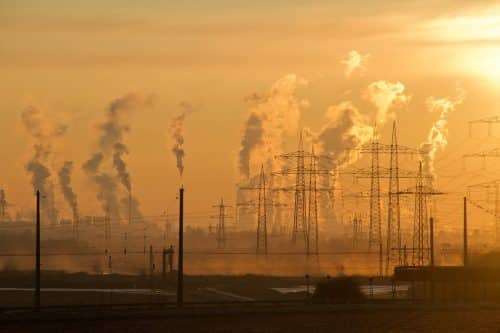Last week the UN climate change conference was held in Bonn. How is the world working to deal with the climate crisis in the shadow of the threats of the retirement of the President of the United States and what does Israel intend to do?

Angle, a news agency for science and the environment
During last week, 195 countries gathered in Bonn, Germany to continue the discussions on how the countries of the world deal with the climate change that is upon us, as part of a conference COP23. The President of the United States, Donald Trump did indeed announce earlier this year that his country would abandon the The global agreement to deal with climate change which was signed at the Paris conference in 2015 (COP21), but Contrary to fears that the move will be followed by other countries, it appears that the rest of the countries of the world remain as committed to the agreement as ever. In fact, the last country that had not signed it - Syria - did so right before the opening of the conference in Bonn.
At the top of the agenda of the conference was A definite central destination: "To strive for a successful, inclusive and ambitious implementation of the Paris Agreement". The conference was led by Fiji, a fact that has many symbolic meanings, because it is a country that stands at one of the most sensitive centers for climate change. As a small island in the Pacific Ocean, northeast of Australia, Fiji with its indigenous population is in serious danger of flooding due to extreme events and sea level rise - both of which are directly related to global warming, and the island already suffering from the effects of climate change. Therefore, it is in Fiji's clear interest not only to work towards the overall realization of the goals agreed upon by the countries in the Paris Agreement, but also to strive to set more advanced goals.
Climate change in Fiji
The Paris Agreement calls for keeping global warming below 2 degrees Celsius above the temperature values before the industrial revolution and as close as possible to a warming of only 1.5 degrees. Fiji's position is that the international community must carry out planned actions and aim for a more ambitious goal - to limit warming to 1.5 degrees At most. For Fiji, and other countries that are relatively vulnerable to the effects of climate change, this is not only an ambitious goal - but the minimum possible that is necessary for their survival.
The goals of this year's conference also included negotiations on the formulation of guidelines for the implementation of a global climate action plan, according to what was established under the Paris Agreement. The partner countries present their efforts to reduce emissions, build adaptation to climate change, financial financing instruments, develop technologies and build coping capacity, as well as illustrate how they will be committed to meeting the goals they have set.
The Telenoa method
Fiji taught us a new word at the conference: Talanoa, which the parties will use as a methodology for building a future dialogue on climate change (especially at the conference to be held in 2018 in Poland, where the countries will discuss expanding their emission reduction targets for the coming years). Telenua is a traditional word used in Fiji and the Pacific Ocean that reflects a process of inclusive dialogue, characterized by active participation and transparency. The purpose of telenoa is to share stories, build empathy and reach wise decisions that take into account the common good. Fiji hopes that this method will help present the best practice for implementing a revolutionary action plan on climate change, and will increase the motivation of the partner countries to implement it.
Elkin is ashamed
On November 9, with the opening of the world conference in Bonn, the Israeli climate conference also gathered here for the second year. The conference was attended by senior officials from the public sector, the academy, the government, many environmental organizations and more, who gathered to discuss Israel's activity to deal with climate change under the title "It is necessary, it is possible, it is worthwhile".
Unlike the previous two years, the Minister of Environmental Protection Ze'ev Elkin did not go to represent Israel at the important world conference in Bonn (the director general of the ministry, Israel Danziger, did not fly to Germany either and the most senior Israeli representative sent on our behalf is the chairman of the Knesset's Interior Committee - MK David Amsalam), but at the Israeli conference Minister Elkin actually participated and delivered a speech that presented the government's progress in achieving the goals it set as part of the Paris Agreement - as well as its lack of progress in other areas. Among other things, Elkin claimed that the goals set by Israel as part of the commitments to the agreement are "a little tricky" - according to his definition. "The 'exercise' of calculating per capita (that is, reducing emissions per capita and not as an absolute political index - MP) is problematic with reference to the demographic scenario for the State of Israel for 2030," said Minister Elkin. Although Israel has committed to reducing the amount of greenhouse gas emissions in its territory by 2030 percent by 26 compared to their level in 2005, this is a per capita reduction only and not an absolute reduction. In fact, when you look at the expected population growth scenario in Israel, it turns out that the total emissions are actually expected to increase by 12.5 percent. This is a very disappointing target in relation to the absolute targets set by other Western countries.
Among the steps taken this year on the way to achieving the goals, Minister Elkin noted the significant reduction in the use of coal, due to the transition to the use of natural gas. "Last year we managed to reduce the use of coal by 17 percent, and according to the forecast, in 2018 we will reach a reduction of 25 percent," he said. "In our opinion, natural gas does not harm health and the environment in a significant way, and on the other hand, it is a key player in reducing the use of coal."

Member of Knesset Dov Hanin, who came up to speak after Minister Elkin, also addressed the issue of natural gas in his speech, and called for striving for a complete stop in the use of coal and to develop as many sources of renewable energy as possible: "We have gas and this is definitely good news - gas is cleaner than coal," he said Hanin, "But gas is also a mineral fuel. We don't need to replace dependence on coal with dependence on gas in the long term. This is an excellent means of transition. We are witnessing an amazing revolution in the last year: for the first time the prices of renewable energy fell below the prices of renewable energy. We are terribly behind the Western countries. The government has a decisive role in creating incentive mechanisms and in removing barriers to the transition to renewable energy.'
In Israel, by the way, less than three percent is currently produced through renewable energy sources (sun and wind), when our commitment according to the Paris Agreement is to reach 17 percent by the year 2030. Minister Elkin also addressed the issue of renewable energy: "Today we are in percentages that shame a country in the Western world ", he said. "We set ourselves goals that are pretentious in relation to our situation today, but in relation to the world they are modest. We are trying to improve the situation and introduce renewable energy also through civil participation - for example by placing solar panels on the roofs. Unfortunately, we are currently not meeting the goals of the application, and without it, in my opinion, we will not be able to meet the renewable energy goals we have set. But this issue is high on our priority list.'
Clean public transportation and cooperative electric vehicles
The topic of transportation was also on the table at the Israeli conference. Minister Elkin pointed out that a significant step taken in the field of transportation is the plan to operate cooperative electric vehicles in Haifa, which is gaining momentum. "Within a short period of time, about 100 such vehicles are expected to operate in Haifa, and a short time later also additional vehicles in Netanya and Kiryat," he said. "According to the accepted standards in the world, each such vehicle takes 14 normal vehicles off the road. But what is important here is mainly the precedent, and less how many vehicles such a move takes off the road directly; As soon as the electric infrastructure is laid out, it will also make it possible to transfer many private vehicles to the electric network, and later also the buses.'
MK Hanin also noted in his speech that one of the things the public should strive for is a revolution in clean public transportation: "We spend a large part of our day stuck in traffic jams," he said. "The government continues to make moves to encourage the use of the private car. This revolution should have two principles: prioritizing public uses over private ones, and prioritizing the clean over the polluting.'
"The Ministry of Environmental Protection is a true partner, but it operates within a government that is very far from seeing the challenge," Hanin concluded his words. "The revolution is in our hands. We need to make our voice heard in a much more significant way."
In conclusion, Minister Elkin clarified that the State of Israel intends to remain committed to the Paris Agreement, with or without the US as a partner in it. "If anyone wondered if the State of Israel was serious about the issue of climate change, and if when the government in the White House changed we changed the tune, he can see that this is not the case," said Minister Elkin. "We knew it was coming, and we made a decision to ratify the agreement and not wait and see what the Americans would do. We very much hope to continue on this path and next year come back here when the list of things we didn't do will be shortened and the list of what we did get longer. My intention is that Israel will meet its goals in accordance with the Paris Agreement. Our ambition is to realize the existing goals and to set more ambitious goals."
See more on the subject on the science website:
